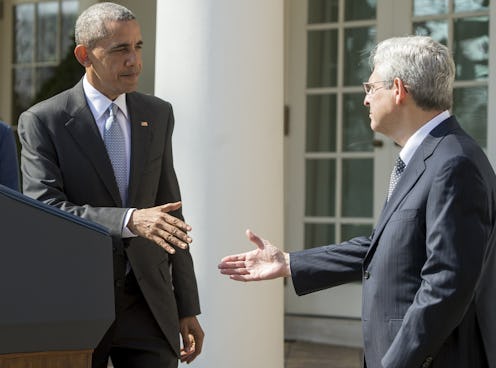News
Is The New SCOTUS Justice A Feminist?
President Obama is set to announce his Supreme Court justice nomination at 11:00 a.m. on Wednesday, and according to some sources, his pick to fill the late Justice Antonin Scalia's seat is Merrick Garland, the chief judge of the United States Court of Appeals for the District of Columbia Circuit. The 63-year-old has previously sat on short lists to fill vacancies in the nation's highest court, after years of service in both the Justice Department and in private practice. He clerked for the late Supreme Court Justice William J. Brennan, Jr., who served as part of SCOTUS' liberal wing, so it is natural to assume that Garland was generally supportive of Brennan's left-wing views. But is this true? Furthermore, could Garland even have feminist beliefs?
His popularity on both sides of the American political spectrum makes this an interesting selection for President Obama, who has had to carefully toe the line between choosing a justice who will think from an objective and liberal headspace, and one who won't see immediate rejection from the Senate's Republican caucus. Many call Garland a great judge, but what does his record as a 19-year veteran of the D.C. Circuit reveal about his stances on women's rights and issues?
By most accounts, Garland is a moderate. For instance, in 2003, on a conservative note, he aligned with an opinion maintaining that the federal judiciary lacks the authority "to assert habeas corpus jurisdiction at the behest of an alien held at a military base leased from another nation, a military base outside the sovereignty of the United States," which essentially prohibited Guantanamo Bay detainees from seeking relief in civilian courts. On the other hand, he was a top contender in 2010 for the nation's high court in the same pool with Justice Elena Kagan, one of the justices of SCOTUS' liberal wing.
He has a strong record as a prosecutor, and oversaw every aspect of the Oklahoma City bombing trial, and his record on gun control legislation is left-leaning. For example, in 1997, a three-person panel of the D.C. Circuit ruled against the District's handgun ban in Parker v. D.C., and Garland was one of four judges who voted for a rehearing.
His views on criminal law consist of conservativism that by some accounts outweighs even Scalia's stances, though Garland convinced some conservatives to move left as concerns the environment and national security. Interestingly, his various legal roles have not allowed for a great deal in the way of women's rights or social issues.
Garland's past still says little of his views toward feminism. His predecessor, Justice Brennan, was a staunch advocate for abortion rights, as well as a recipient of the Presidential Medal of Freedom from Democratic President Bill Clinton.
If he become the newest SCOTUS justice, will that role afford Garland the opportunity to fight for women, especially given his enduring love for his wife of 28 years? Time will tell, but his moderate record and service under Justice Brennan speak volumes about his ability to think objectively, which will almost certainly help in the way of making strides forward for women.
